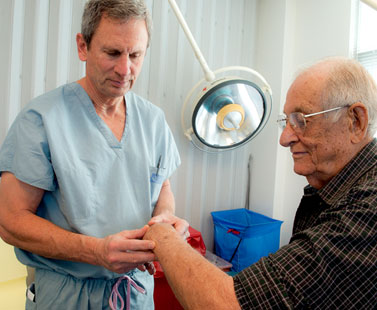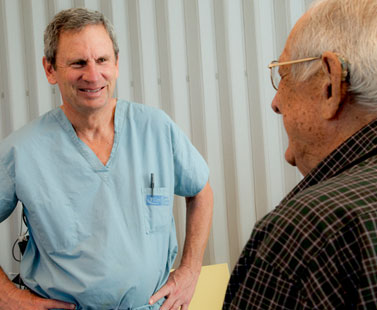USF among 21 sites for melanoma vaccine study published in New England Journal of Medicine
Vaccine and IL-2 improve response, survival in patients with advanced melanoma
Tampa, FL (June 2, 2011) — A vaccine for advanced melanoma, supplemented by the immunotherapy drug interleukin-2, has shown promise in one of the most comprehensive studies of the skin cancer vaccine’s effectiveness to date.
The University of South Florida was among the 21 centers nationwide participating in the phase 3 clinical trial involving 185 patients. Results of the randomized trial, sponsored by the National Cancer Institute, are reported today in the New England Journal of Medicine.

USF Health surgeon Dr. Douglas Reintgen was local principal investigator for a promising NCI-sponsored melanoma vaccine study published in the New England Journal of Medicine.
The study found that a peptide vaccine in combination with interleukin-2 significantly boosted response rates and improved disease-free and overall survival, when compared to interleukin-2 alone. It is the first phase 3 trial to clearly demonstrate a survival benefit in a vaccine for melanoma, said USF site principal investigator Dr. Douglas Reintgen, professor of surgery at USF Health.
“Response rates for the two approved drugs currently available for stage 4 melanoma are not very good,” Dr. Reintgen said. “This combination approach with the vaccine appears to give patients a better treatment option. Hopefully, it will be approved by the Food and Drug Administration and commercially available within a year or so.”
While melanoma accounts for less than 5 percent of all skin cancers, it causes the most skin cancer deaths, according to the American Cancer Society. The ACS estimates that in 2010 about 68,130 new cases of melanoma were diagnosed in the United States and about 8,700 Americans died from the disease.
If detected early the potentially lethal skin cancer can almost always be cured by surgery. However, the five-year survival rate for metastatic melanoma, which has advanced and spread to other parts of the body, is less than 10 percent.
The researchers compared two groups of eligible patients with metastatic melanoma. All study participants received intravenously administered doses of high-dose interleukin-2. One group received a peptide vaccine along with the interleukin-2 therapy.

The combination approach with the vaccine “appears to give patients a better treatment option,” Dr. Reintgen says.
Patients who got the vaccine and interleukin-2 were more than twice as likely to respond to treatment (16.5 percent response rate) than those who received interleukin-2 alone (6.5 percent). Progression-free survival (survival without recurrence) was improved for the vaccine group — 1.7 to 3.9 months compared to 1.5 to 1.8 months for the interleukin-2 only group. Median overall survival was 17.8 months for the vaccine group and 11.1 months for the interleukin-2 only group.
The vaccine added little toxicity to the interleukin 2. Side effects were minor — localized reactions of redness, swelling and pain at the vaccination site.
Making an effective vaccine against melanoma has proven to be harder than developing vaccines for infectious diseases. Melanoma vaccines currently under investigation are not intended to prevent melanoma, but rather to boost the body’s natural immune responses to existing tumors
“Different types of melanoma have different molecules on their surface that make the cancer resistant to immune attack,” Dr. Reintgen said. “It’s a big challenge that is difficult to overcome with one vaccine, so different vaccines may be needed for different people – or new therapies combining a more potent vaccine with immune drugs.”
The investigational peptide vaccine stimulates the body’s circulating cytotoxic (killer) T-cells to recognize specific antigens, or proteins, on the surface of the tumor. The T-cells then attack the melanoma cells directly.

“If you can rev up the body’s own defense system so it creates more T-cells to kill the cancer without destroying healthy tissue, then you have prospect for an effective vaccine,” Dr. Reintgen said.
Or, as the study authors conclude: “This study demonstrates that a vaccine can enhance cytokine therapy in patients with melanoma and highlights the potential of rational combinations of immune agents.”
– USF Health –
USF Health is dedicated to creating a model of health care based on understanding the full spectrum of health. It includes the University of South Florida’s colleges of Medicine, Nursing, Public Health and Pharmacy, the School of Biomedical Sciences and the School of Physical Therapy and Rehabilitation Sciences; and the USF Physician’s Group. Ranked 34th in federal research expenditures for public universities by the National Science Foundation, the University of South Florida is a high impact global research university dedicated to student success.
Media contacts:
Anne DeLotto Baier, (813) 974-3300 or abaier@health.usf.edu
Susanna Martinez Tarokh, (813) 974-2776 or smartin1@health.usf.edu
Photos by Eric Younghans, USF Health Communications

